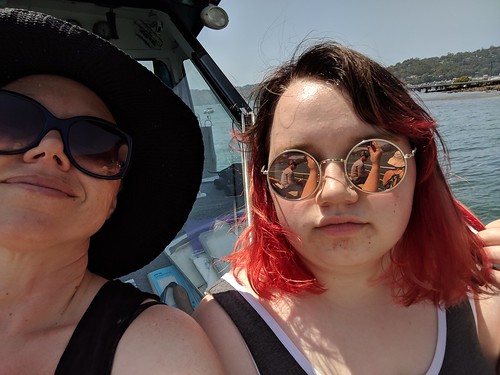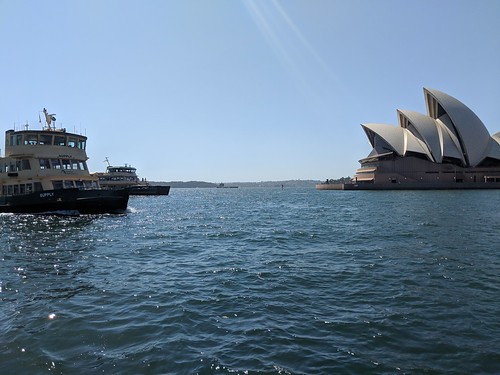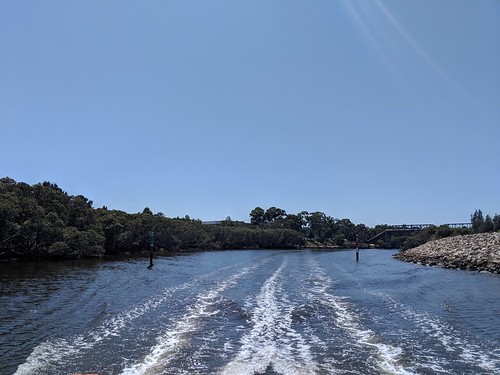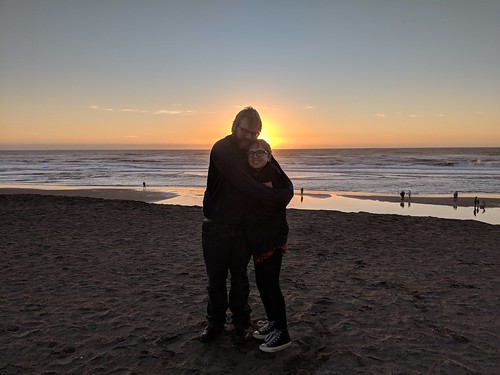Author Archive
Sunday, March 31st, 2019
Last night as I was drifting off to sleep, I thought about Frenchs Forest, where I grew up, and the tiny pieces of bush that I knew so well: the undeveloped block adjoining the high school, which is now the Northern Beaches Hospital; the little steep park around the corner from our house, called Blue Gum Reserve; and the steeper gully leading into Bantry Bay, which is now part of Garigal National Park, named for the traditional custodians of the land.
Liz has been talking about BART stations through time, and for a minute I could see all those little remnants joined up into one vast sea of dry sclerophyll woodland fading into the blue distance. There were sandstone boulders and shady overhangs. Banksias and grevilleas grew brilliant and spidery in the understory. It smelled like eucalyptus trees under the hot sun and sounded like cicadas singing. This was my home country for tens or hundreds of thousands of years, before the houses were built, even before special constable and crown lands ranger James Ffrench clear-felled the forest that now, in ghost form, bears his name.
I realized that the high sandstone flats, in Allambie and Narraweena and Beacon Hill, are carved and were likely ceremonial. People would live closer to fresh water, I thought. As I traced in my mind the clear cool creeks (Frenchs, Carroll, Bates) that run down into Middle Harbour, I realized that the rill that ran across the bottom of the high school oval and into Rabbett Reserve (willow trees and golden sand, frogs and tadpoles) ran the other way, into the confusingly-named Middle Creek. My home was high on the watershed itself.
Middle Creek flows not into Middle Harbour but into Narrabeen Lagoon. According to the Dictionary of Sydney:
The camp site at Narrabeen Lagoon was the last community Aboriginal town camp to survive in the northern Sydney suburbs. Probably, before the British invasion, Narrabeen Lagoon was one of the many coastal occupation sites offering seasonal shelter, fish and wetland resources… higher and less accessible country was used for ceremonial and educational purposes by the Gai-mariagal. Dennis Foley, a Gai-mariagal (Camaraigal) descendant, describes the area as ‘the heart of our world’.
Dennis Foley has written of the destruction of the camp in the 1950s, when what became the Academy of Sport was built. When I was a child in the 1970s, it was whispered that there were still people living there. These were the survivors of the genocide of the Eora people. There is no sign or memorial.
I’ve been thinking a lot about gods and goddesses and the dead: la Calavera Catrina and Guadalupe and Epona, all psychopomps, all syncretist beings like me. I’ve been thinking about AORTA’s Theory of Change:
Decades of neoliberal policy have erased histories of enslavement and genocide, and the movements that fought and resisted along the way. Today’s social movements are often disconnected from local, regional, national, and global movement history, which can lead to a sense of isolation and alienation.
And about this essay, in which:
Derrida asked, ‘Is it possible that the antonym of “forgetting” is not “remembering”, but justice?’
Gods and goddesses move around outside time, where the dead are not gone, just elsewhere. Historical memory is a kind of augmented reality, a map drawn in the colors of love and grief and anger. May I honor the memory of my dead. May they seek justice through me. May I be a good ancestor in my turn.
Posted in australia, grief, history, mindfulness, sanity, the end of all things | Comments Off on flow
Thursday, March 21st, 2019

In news that should surprise literally no one, I conceived a great fondness for Montréal.

So blue, so French, so accessible from San Francisco except in the event that the entire Air Canada 737 Max fleet is grounded. Ah well.

Posted in adventure time | Comments Off on bonsoir bye bye
Tuesday, March 19th, 2019
Taste is a means of distinguishing ourselves from others, the pursuit of distinction. And its end product is to perpetuate and reproduce the class structure.
Posted in bookmaggot | Comments Off on celine dion’s let’s talk about love, by carl wilson
Saturday, March 16th, 2019
I imagine a near future in which all my parts might align.
Posted in bookmaggot | Comments Off on witches of america, by alex mar
Sunday, March 10th, 2019
Imagine an Australia where the Aboriginal people negotiated a treaty and were never invaded by Europeans; where the trade routes embedded in the great songlines across the continent remained intact. Imagine what Australia could have been like today, if Aboriginal people had continued as the sovereign owners of the country. Imagine the Badi people farming pearls in partnership with Japanese traders; the Gija mining gold and diamonds and trading with the Chinese; the Pintupi sharing culture and wisdom with eco-tourists in a sustainable glass tower adjacent to Uluru; the Eora, enjoying the fruits of environmentally friendly condo development around Sydney Harbour.
Posted in australia, bookmaggot | Comments Off on the dealer is the devil, by adrian newstead
Tuesday, March 5th, 2019
It was always sad leaving here. And how many more times would she be coming back now. Realistically.
Posted in bookmaggot | Comments Off on little fish, by casey plett
Wednesday, February 27th, 2019
The Pacific chuckled softly: it was insane, twinkling away in a violent blue dream.
Posted in uncategorized | Comments Off on the life to come, by michelle de kretser
Tuesday, February 26th, 2019
I’ve had the Split Enz song “Six Months In A Leaky Boat” on constant replay this trip. I wasn’t at all surprised to find out Tim Finn wrote it after a nervous breakdown. I complained to Jeremy that everything I want to say about the legacy of settler colonialism and consequent mental illness, this song says in five minutes.
Aotearoa, rugged individual
Glisten like a pearl, at the bottom of the world
The tyranny of distance, didn’t stop the cavalier
So why should it stop me? I’ll conquer and stay free
Ah c’mon all you lads, let’s forget and forgive
There’s a world to explore, tales to tell back on shore
I just spent six months in a leaky boat
Six months in a leaky boat
An old friend tried to argue that Doctor Who isn’t a modern King Arthur myth because “no one cares that much about stories.” And yet it moves. In case you’re not convinced that this song is a miracle of subversive irony, I’ll just point out that Thatcher banned it during the Falklands War.
Posted in australia, grief, history, little gorgeous things, sanity | Comments Off on lucky just to keep afloat
Sunday, February 24th, 2019
There was a time when the notion of beauty would not have entered my head, when it was simply my place. I did not know it was beautiful
Posted in australia, bookmaggot | Comments Off on craft for a dry lake, by kim mahood
Thursday, February 21st, 2019
We enjoyed the Rivercat so much that we’ve taken two more ferries, one around Scotland Island from Church Point and one to the Basin from Palm Beach. Pittwater smells of salt and diesel, the smell of my childhood. There are cormorants and kookaburras, gulls and jellies.

I read this remarkable essay about Australian childrens’ books as well as a thoughtful article about the high country brumbies that I can’t share because it’s paywalled to hell. Like the mustangs in California, Australia’s feral horses wreck delicate ecosystems. Scientists and the traditional owners of country want them gone. But local cattlemen lost grazing land to the Snowy hydro scheme and to the National Parks well within living memory. To them, the brumby cull is the last straw. In the paywalled article, National Party MP Peter Cochran whines: “You don’t have to be black to feel a connection to this land.”
I grew up on stories about brumbies, by Mary Elwyn Patchett and Elyne Mitchell. In them, the wild horse is as much a part of the bush as the possum and the kangaroo. It took me decades to recognize this as a way for white people to lay claim to what wasn’t theirs. When I revisited Patchett hoping to read her books to the kids, I was appalled by her racism. Mitchell’s father was Harry Chauvel of the charge on Beersheba. Both writers are immersed and complicit in the white supremacist, militarized, settler-colonialist narrative that Evelyn Araluen describes in her essay.
Even my beloved Swallows and Amazons, with its naval officer father and its mother who grew up sailing on Sydney Harbour, instructs children in exploration, mapping and conquest. Maybe Westerners can’t have innocent pleasures. There is nothing – absolutely nothing – half so much worth questioning as simply messing about in boats. Do you want empires? Because that’s how you get empires.
Posted in australia, bookmaggot, children, grief, horses are pretty, mindfulness, politics, ranty | Comments Off on messing about in boats
Sunday, February 17th, 2019
I miss Port Jackson a lot; people who say that the Bay is like it don’t seem to know either of them very well.

Last year we went to Cockatoo Island. This year we decided to keep going, as far as we possibly could, all the way to Parramatta. It was very hot and we all got sunburned and this is the cover of our next album.

I expected something vaguely industrial from the Parramatta River. Instead I got mangroves and casuarinas, pelicans and ibis.

Sydney is so enormously full of surprises that I do not think I will ever come to the end of it.
Posted in adventure time, australia | Comments Off on and a cormorant, not shown
Saturday, February 16th, 2019
I wrapped up a mighty four weeks at work before skiving off on (previously-scheduled) hols. My signature achievement so far is having matched names to faces for my boss’s eighteen direct reports. If you think I’ll retain that mapping after a fortnight sitting on Sydney beaches eating mangos, I have several bridges you might like to purchase.
This was my first time flying with my brand new cyborg leg. Despite what my doctors told me, it does indeed set off the metal detectors. I was frisked around the scar tissue, which was very interesting. Otherwise our flights were uneventful. You walk out of the Sydney international terminal into a wall of southern hemisphere summer and if you are me, it brings tears to your eyes.
Posted in australia | Comments Off on halfway across the world
Monday, February 4th, 2019
I’m afraid of women who have internalized their experiences of misogyny so deeply that they make me their punching bag.
Posted in bookmaggot | Comments Off on i’m afraid of men, by vivek shraya
Sunday, February 3rd, 2019
This has been the cardinal fiction of my life, its ruling principle: if I work hard enough, I’ll get what I want.
Posted in bookmaggot | Comments Off on the incendiaries, by r.o. kwon
Thursday, January 31st, 2019
He took a moment to work out the best possible phrasing, knowing it was futile because she’d find something to be insulted by…
Posted in bookmaggot, grief | Comments Off on any old diamonds, by kj charles
Monday, January 21st, 2019
Almost a year after I thought it might, my accidental sabbatical has come to a definitive end. This morning, Laura and I rode Gemini and Bentley around a Horse Park almost violently green from the winter rains. I went to therapy for my weekly ugly-cry, spent the afternoon folding laundry, then dragged J and J to the beach to watch the sunset.

The sea had carved the sand into a cliff three or four stories high. We stood at the brink, inadequately dressed against an Alaskan wind. Just as the sun disappeared beneath the horizon, its light turned a pale celadon. I’ve never seen the green flash before! Conditions have to be perfect. Julia was blinking and missed it. I told her she is young and will have lots more chances.
It’s hard to sum up this long career hiatus in any narratively pleasing way. I wrote less than I thought I would, and did a lot more political organizing than I’d ever imagined. One business venture has yet to bear fruit, but the other two are the most beautiful and gifted startups ever to occupy San Francisco office space. I made some amazing new friends and grew closer to some old ones. I think my kids are doing pretty okay? I continue to love my mister more than I love sunbeams, or meadows, or tea.
Tomorrow’s big adventure is to get up early and take BART to work!
Posted in adventure time, grief, little gorgeous things, meta, san francisco | Comments Off on the green flash
Saturday, January 19th, 2019
…in the long run, diminishing my experience hurt me far more than it helped.
Posted in bookmaggot | Comments Off on not that bad, by roxane gay
Tuesday, January 15th, 2019
He’d spent almost five years trying to beat back his grief; the idea of welcoming it in felt obscene.
Posted in bookmaggot | Comments Off on the proposal, by jasmine guillory
Wednesday, January 2nd, 2019
…she could not imagine that there could be on the screens anyplace images that would speak to her pain, her need, her loneliness, images that would make her feel good.
Posted in bookmaggot | Comments Off on the high cost of living, by marge piercy
Monday, December 31st, 2018
Honestly though this was a devastatingly hard year, politically, professionally, and personally; and it was the fifth such year in a row. Breaking my leg was the least of it.
It was too blustery to ride today, but too sunny to stay inside, so Jeremy and I went for a walk in Heron’s Head Park.

It’s the site of a never-completed shipping terminal, next to the decommissioned Hunter’s Point Power Station, not far from where Islais Creek, our local watershed, meets the Bay. Back in the 90s, citizen activists spearheaded wetlands restoration and now it’s a sparkling salt marsh, a magnet for pelicans and sandpipers. There’s an eco center with a living roof.

We walked and talked for a long time, and then dropped by Bay Natives nursery and bought some eggs still warm from the nest. Reclaimed Industrial Landscape is one of my top three aesthetics, and my hope for the new year is that the same transformation can happen in my cold dead heart.
Posted in adventure time, grief, little gorgeous things, mindfulness, san francisco, sanity | Comments Off on watershed









